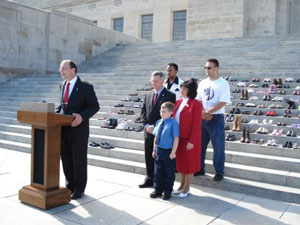 |
UNMC’s Pierre Fayad, M.D., speaks at a Thursday news conference about stroke awareness as Nathaniel Hathaway, lower right, Gov. Dave Heineman and his wife, Sally Ganem, second row, Toumani McCain, upper left, and Anthony Carlson, upper right, look on. Hathaway, McCain and Carlson are stroke victims. The shoes in the background represent Nebraskans killed by stroke in the past year. |
The Heartland Affiliate of the American Heart Association placed 83 pairs of shoes on the steps to symbolize the number of Nebraskans lost each month to stroke. Heineman and the First Lady set down the 82nd and 83rd pairs.
Heineman signed a proclamation, declaring May as American Stroke Month in Nebraska.
“I urge Nebraskans to familiarize themselves with the signs and symptoms of a stroke,” Heineman said. “Through awareness and prevention, we can begin to reduce the devastating effects of stroke in Nebraska.”
According to Nebraska Health and Human Services System, approximately 1,000 Nebraskans die each year due to a stroke. Many more are left permanently disabled.
During a stroke, a blood vessel supplying blood to the brain bursts or is blocked by a blood clot. Nerve cells in the affected area of the brain can be damaged within minutes and can die within hours.
The warning signs of stroke are:
- Sudden numbness or weakness of the face, arm or leg, especially on one side of the body;
- Sudden confusion, trouble speaking or understanding;
- Sudden trouble seeing in one or both eyes
- Sudden trouble walking, dizziness, loss of balance or coordination; and
- Sudden severe headache with no known cause.
If you witness someone having a stroke, call 9-1-1 immediately. People experiencing these symptoms have only three hours to get to a hospital to be assessed as a candidate for a clot-busting drug that may help reduce the devastation of stroke.
While it is most common among the elderly population, people of all ages can have a stroke. In fact, 2.7 in 100,000 infants and young children suffer a stroke each year in the United States. Despite current treatment, one out of 10 children with ischemic stroke, the most common type, will have a recurrence within five years.
“It’s important for everyone to know the warning signs — including young people,” said Pierre Fayad, M.D., medical director of the stroke center at The Nebraska Medical Center and Reynolds Centennial Professor and Chairman of Neurological Sciences at UNMC.
Personal stories were shared like that of Toumani McCain. Like many, McCain thought stroke struck only older people. But McCain has learned that anyone, at any age can have a stroke — McCain did at age 26.
“I had a migraine headache that was out of this world,” McCain said.
The headache had lasted for three days and was an early indicator of a stroke. While talking on the phone with his mother, McCain heard a faint crunch noise and went numb on his left side.
“Something is wrong,” he said to his mother as he fell over. Being a nurse, McCain’s mother recognized the symptoms of a stroke and immediately called 9-1-1 for her son.
“They thought I wouldn’t make it through the night,” McCain said. “Luckily, I ended up having a fast recovery.”
After one month in the hospital, McCain began rehab where he re-learned how to do basic activities like walking and talking. Today, the only reminders McCain has of his ordeal are occasional memory blips and daily blood thinners he must take to prevent a future stroke.
Stroke risk factors fall into two groups, those that can be changed and those that can’t. Risk factors that can be changed include high blood pressure, smoking, diabetes, carotid or other artery disease, atrial fibrillation, other heart disease, sickle cell disease, high blood cholesterol, poor diet and physical inactivity and obesity. Risk factors that can’t be changed include age, ethnicity, heredity and prior heart disease or stroke.
“I had two risk factors going against me. As an African American with a family history of stroke, I have to pay closer attention to my health,” McCain said.
Blacks are twice as likely as whites to suffer a first-time stroke. The American Stroke Association launched the Power to End Stoke Campaign in 2005 to improve this health disparity by educating blacks about their higher risk for stroke.
“Now that I know my risk, I can take control of my health,” McCain said. “I’m thankful that I still have an opportunity to do that for myself and encourage other young people to do the same.”
McCain is a musician and owns his own record label, Tainted Angel Records. He is sharing his story and message with young people across Nebraska through a medium they can relate to — his music. He will travel to Kearney, Lincoln and Omaha with two other musical acts on what he calls the Phoenix Tour.
“Before this happened, I had a typical young person’s attitude about my health — I’m invincible,” he said. “I took life for granted, but now feel like I’ve been reborn through this process and am called to help others. That’s why I call this the Phoenix Tour.”
Proceeds from the tour will benefit the American Stroke Association.
For more information on stroke and the American Stroke Association, call 888-4STROKE or visit www.strokeassociation.org. The American Stroke Association is a division of the American Heart Association. For more information on Toumani McCain, log on to www.taintedangel.com.